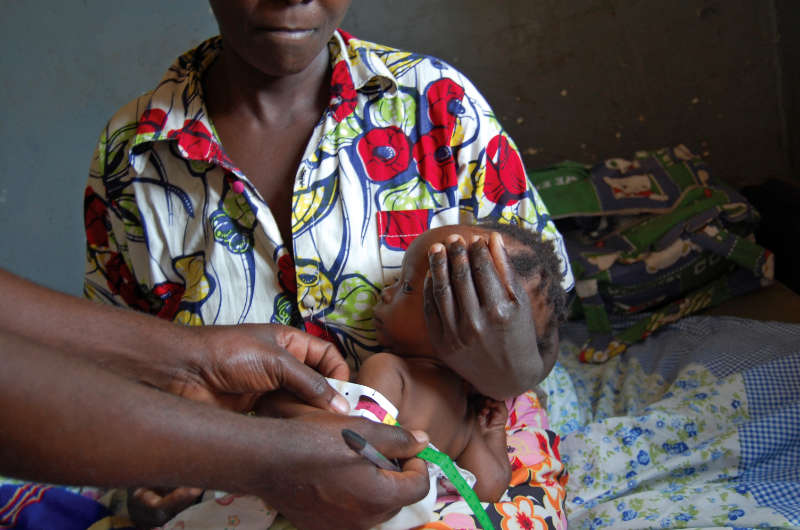NuLife breastfeeding counselor talks to women in the community about the baby-friendly health facility initiative. Photo credit: URC
NuLife – Food and Nutrition Interventions for Uganda
The Challenge
Provide technical support to integrate nutritional assessment, counseling and support into HIV/AIDS services, build local capacity for production of ready-to-use therapeutic food, and establish sustainable livelihoods opportunities for cured clients.
Overview and Objectives
URC supported the Ministry of Health (MOH) to improve the nutritional and health status of people living with and affected by HIV/AIDS by integrated nutrition into HIV/AIDS services at the health facility and community levels. The project’s primary target groups are HIV-positive adults, pregnant and lactating women, and orphans and vulnerable children. Project objectives:
- Work closely with the MOH to develop national policies, training materials, and job aids to support the integration of nutrition into HIV services
- Strengthen the capacity of community and facility health care providers in 54 sites in nutritional assessment, counseling, and treatment and to integrate these services into HIV/AIDS programs
- Link community volunteers to health facilities for referral, counter-referral, and follow-up
- Establish the capacity of a local food manufacturer to produce ready-to-use therapeutic food (RUTF) from locally available ingredients; and
- Establish sustainable livelihood opportunities for local farmers through groundnut production, including linking clients treated for malnutrition to these opportunities.
Achievements
- Supported the MOH to launch and disseminate policy guidelines on infant and young child feeding.
- Provided technical assistance to the MOH to develop nutrition policy guidelines, training curricula, and job aids on comprehensive nutrition care and support for people living with HIV/AIDS.
- Implemented quality improvement activities to support the integration of nutrition into HIV services in collaboration with the USAID Health Care Improvement Project (see illustrative results below).
- Engaged a local manufacturer, Reco Industries, Ltd, to produce RUTF; aided in the local production of 120 metric tons of RUTF that met international standards.
- Facilitated the addition of RUTF to Uganda’s Essential Drug List, ensuring a consistent supply at health facilities countrywide.
- Assessed and treated 15,537 HIV-positive individuals for acute malnutrition.
- Supported use of mid-upper arm circumference (MUAC) tapes to assess the nutrition status of HIV-positive individuals; the tape was not used at project start but by project end, over 95% of these individuals were assessed with the tape.

- Supported nutrition counseling during clinic visits for HIV-positive individuals; such counseling increased from 0% in 2008 to 40.7% in 2011.
- Fostered a partnership of Reco Industries, Ltd, the Diocese of Northern Uganda, Gulu Regional Referral Hospital, and The AIDS Support Organization to start a sustainable livelihoods project in the Gulu Region; the project provided clients who had completed malnutrition care for with livelihood opportunities to ensure that they and their families could sustain good nutritional status.
- In collaboration with Reco Industries, Ltd, provided support in the form of sustainable livelihoods to more than 4000 farmers to produce groundnuts for Reco’s production of RUTF; more than 50% of these farmers were women and about 20% were HIV positive.